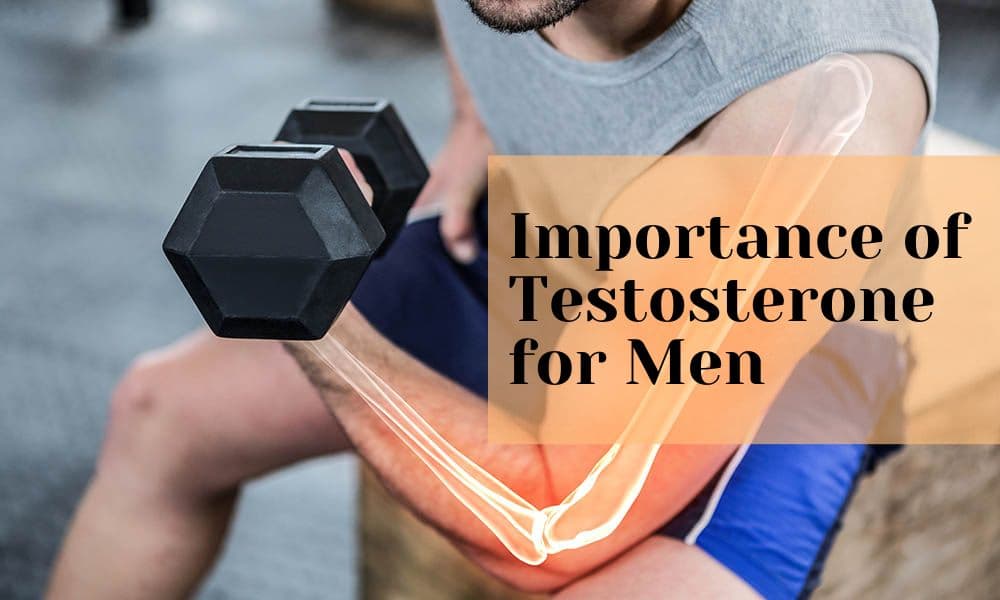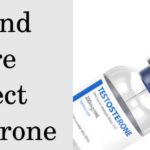Testosterone, a vital hormone in men, plays a crucial role in maintaining physical, mental, and sexual health. Normal testosterone levels are essential for various bodily functions, including muscle mass and strength, bone density, fat distribution, and sex drive.
As men age, testosterone levels naturally decline, leading to potential health issues such as reduced energy, mood changes, decreased muscle mass, and impaired sexual function. This condition, often termed hypogonadism or low testosterone (Low T), affects a significant portion of the adult male population.
Testosterone replacement therapy (TRT) emerges as a promising solution for men grappling with Low T. By restoring T levels to a normal range, this therapy aims to alleviate symptoms and improve quality of life.
It has been linked to benefits such as increased muscle strength, improved sexual function, enhanced mood, better cognitive function, cardiovascular health and bone density improvement.
However, it’s not a one-size-fits-all remedy and requires a thorough evaluation by healthcare professionals. This article delves into the multifaceted benefits of testosterone therapy for men with Low T, backed by scientific evidence, and highlights the importance of individualized treatment to achieve balanced T levels and overall well-being.
What is Testosterone and Why It is So Important?
Testosterone, a primary male sex hormone, is pivotal in the development and maintenance of male physical characteristics. Produced primarily in the testes, it plays a crucial role in various bodily functions.
Understanding the importance of normal T levels is essential for recognizing the potential benefits of testosterone therapy. In men, testosterone helps maintain:
- Muscle Mass and Strength: Testosterone aids in building and maintaining muscle mass and strength, crucial for physical fitness and overall health.
- Bone Density: It plays a significant role in bone health, helping to prevent conditions like osteoporosis, particularly in older men.
- Fat Distribution: Testosterone influences body composition, affecting how men store fat and maintain weight.
- Sexual Health: It’s fundamental for sexual development and maintaining sexual function, including libido and erectile function.
- Mood and Mental Health: Adequate levels of testosterone are associated with better mood, lower risk of depression, and improved cognitive functions.
- Red Blood Cell Production: Testosterone aids in the production of red blood cells, which are vital for carrying oxygen throughout the body.
Normal testosterone levels vary depending on age, health, and other factors. However, when levels fall below the normal range, it can lead to symptoms like fatigue, decreased libido, reduced muscle mass, and mood disturbances.
What Does Testosterone Therapy Do?
Testosterone treatment is designed to address low T in men as a medical treatment that has garnered significant attention for its potential benefits. Understanding who should consider this therapy and its physiological impacts is crucial for informed healthcare decisions.
Who Should Consider Testosterone Therapy?
TRT is primarily recommended for men who have clinically low T levels, often diagnosed through symptoms and blood tests. Ideal candidates include:
- Men with Hypogonadism: This condition, where the body doesn’t produce enough testosterone, can be either primary (due to testicular issues) or secondary (due to hypothalamic or pituitary problems).
- Older Men with Low T Symptoms: Aging men experience symptoms like fatigue, reduced libido, muscle weakness, and mood changes, which are attributable to low testosterone levels.
- Men with Certain Medical Conditions: Conditions like type 2 diabetes, obesity, or hormonal disorders, which are often associated with lower T.
What Does Taking Testosterone Do to a Man?
Testosterone therapy aims to mimic the body’s natural testosterone production, thereby alleviating symptoms of low T. It can lead to a significant improvement in quality of life, physical health, and psychological well-being.
However, it’s not without risks and potential side effects, such as increased red blood cell count, sleep apnea, or prostate growth. Therefore, therapy must be closely monitored by healthcare professionals.
TRT can be a transformative treatment for men with clinically low testosterone levels, offering improvements in physical, sexual, and mental health. However, its suitability and safety must be evaluated on an individual basis, underlining the importance of personalized medical advice and supervision.
Benefits of Testosterone Therapy
Testosterone replacement therapy, when appropriately administered to men with clinically low T, can offer a spectrum of benefits spanning physical, mental, emotional, and sexual health.
Physical Health Improvements
- Muscle Mass and Strength: Testosterone plays a critical role in muscle development. Therapy can lead to increased muscle mass and strength, which is particularly beneficial for those experiencing muscle atrophy due to low testosterone levels.
- Bone Density: Testosterone has a direct impact on bone density. Therapy can increase bone mineral density, reducing the risk of osteoporosis and fractures, a significant concern in older men.
- Body Composition: It often leads to a reduction in body fat and can help in better weight management. This is particularly relevant for men with obesity or metabolic syndrome.
- Red Blood Cell Production: Testosterone therapy can increase red blood cell count, which may improve oxygenation and overall vitality, although this needs to be monitored to prevent potential complications like polycythemia.
- Cardiovascular Health: The relationship between testosterone therapy and heart health is complex and still under research. Some studies suggest potential benefits in cardiovascular function, but this is not universally accepted and requires careful patient selection and monitoring.
Mental and Emotional Health Benefits
- Mood and Well-being: Improved testosterone levels are often associated with better mood, reduced anxiety, and a general sense of well-being.
- Cognitive Function: Some evidence suggests that testosterone therapy can improve certain aspects of cognitive function, although this is an area of ongoing research.
- Energy Levels: Many men report increased energy levels and reduced fatigue, contributing to an overall improvement in quality of life.
Sexual Health Enhancement
- Libido: Testosterone is a key driver of sexual desire. Therapy often results in a significant improvement in libido.
- Erectile Function: Testosterone therapy can improve erectile function, particularly in men whose erectile dysfunction is linked to low T levels.
- Overall Sexual Satisfaction: Beyond libido and erectile function, overall sexual satisfaction often improves, which can be a critical aspect of a man’s life and relationships.
Also, TRT can offer multifaceted benefits for men with low testosterone. These improvements span across physical, mental, and sexual health domains, contributing to enhanced quality of life.
How Safe is Testosterone Therapy?
The safety of testosterone therapy, particularly in specific conditions like diabetes, heart health, post-prostate cancer, in the elderly, and considerations around long-term use and discontinuation, is a nuanced topic. It’s crucial to weigh the benefits against potential risks, and decisions should always be made in consultation with healthcare professionals.
Is Testosterone Therapy Safe for Diabetics?
For men with diabetes, particularly type 2, therapy can offer benefits like improved insulin sensitivity and better glycemic control. However, it should be approached cautiously, with regular monitoring of blood sugar levels to adjust diabetes treatment as necessary.
Is Testosterone Therapy Safe for Long-Term Use?
The long-term safety of testosterone therapy is still under investigation. While short-term use appears to be relatively safe in appropriately selected individuals, the long-term effects require careful monitoring. Potential risks include polycythemia, sleep apnea, and cardiovascular issues.
Impact on Heart Health
The impact of testosterone therapy on heart health is complex. Some studies suggest potential cardiovascular risks, especially in older men or those with pre-existing heart conditions, while others indicate possible benefits. It’s essential to assess cardiovascular health before and during therapy and to monitor for any signs of heart-related side effects.
Is It Safe to Use Testosterone Therapy After Prostate Cancer?
Testosterone treatment in men with a history of prostate cancer is controversial. Historically, it was considered contraindicated due to concerns about stimulating cancer growth. Also, TRT might be safe in certain cases of clinically significant hypogonadism after a thorough risk assessment and under strict urological supervision.
How Safe Is Testosterone Therapy For the Elderly?
In elderly men, the decision to start testosterone therapy should be made with caution. Age-related decline in testosterone is normal, and the risk-benefit profile may differ from younger men. Potential benefits must be weighed against increased risks of side effects in this age group.
Can You Stop Testosterone Therapy Once Started?
Discontinuing TRT is possible, but it should be done under medical guidance. Abrupt cessation can lead to withdrawal symptoms like fatigue, depression, and the return of low testosterone symptoms. A gradual tapering may be recommended, and alternative treatments to manage symptoms should be considered.
In summary, while testosterone therapy can offer significant benefits in certain populations, its safety profile varies depending on individual health conditions, age, and the presence of comorbidities.
How to Monitor and Manage Risks of Testosterone Therapy
Monitoring and managing the risks associated with testosterone therapy is a critical aspect of treatment, ensuring both efficacy and safety for patients. TRT comes with potential side effects, the prevalence of which can vary based on individual health factors and the mode of therapy.
Common side effects of testosterone therapy include acne and oily skin, increased red blood cell count (polycythemia), which can increase the risk of blood clots, sleep apnea, and breast enlargement or tenderness.
Some men may experience a decrease in sperm count, which can affect fertility. There’s also a risk of exacerbating existing prostate issues, although recent studies suggest that testosterone therapy does not increase the risk of prostate cancer. Mood swings and aggression are also reported in some cases, though these are less common.
When undergoing testosterone therapy, it’s crucial to monitor several key health parameters. Regular blood tests are essential to check testosterone levels, ensuring they are within the therapeutic range.
It’s also important to monitor red blood cell count, lipid profiles, liver function tests, and PSA (prostate-specific antigen) levels. Regular check-ups should include assessments of cardiovascular health, especially in older men or those with pre-existing heart conditions.
For those receiving testosterone injections, precautions are taken to minimize risks. Injections should be administered by a healthcare professional or under their guidance to ensure proper dosage and technique.
The injection site needs to be rotated to prevent tissue damage. Patients are educated about recognizing signs of complications, such as redness, swelling, or pain at the injection site, which could indicate an infection or allergic reaction.
Patients on TRT should be aware of the symptoms that might indicate side effects, such as shortness of breath, chest pain, leg swelling, severe and persistent headaches, or significant changes in mood and behavior. Immediate medical attention is required if these symptoms occur.






